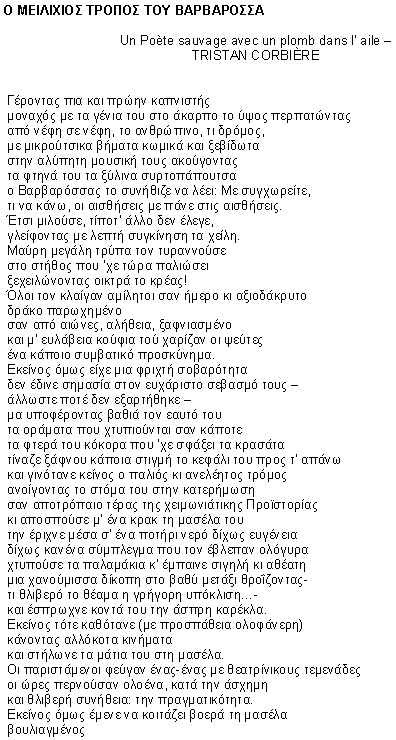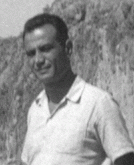Poem
Nikos Karouzos
THE MELLOW BEHAVIOR OF BARBAROSSA
Un Poète sauvage avec un plomb dans l’aile –An old man now and former smoker,
all alone with his beard, strolling the heights in vain,
from cloud to cloud, the human course, what a road it is,
with tiny steps, comic and exhausted
hearing in their pitiless music
his cheap wooden shoes shuffling,
Barbarossa used to say: Forgive me
I can’t help it, the senses lead me to the senses.
That’s how he talked, he didn’t say anything else,
licking his lips with delicate emotion.
He was oppressed by a large black
hole in his chest which had now become old
with flesh spilling out lamentably!
Speechless, everyone wept for him, as if for a tame and pitiful
dragon of bygone times
and as if shocked, truly, for centuries
the liars paid him, with hollow piety,
somewhat conventional respects.
He, however, had a terrible kind of seriousness
paying no attention to their innocuous respect –
moreover he never depended on it –
but suffering most profoundly his very self,
the visions which sometimes slapped together like
the wine-cooked wings of a slaughtered cockerel,
he would suddenly throw his head back
and become that merciless terror he once was
opening his mouth in utter devastation
like a hideous monster of wintry prehistory
and detaching his dentures with a crack
would drop them in a glass of water, without any delicacy,
without any sense of inferiority, everyone around looking at him;
he’d clap his hands and a two-faced Turkish woman
would come in silently and invisibly with heavy silk rustling –
how sorrowful the spectacle, a quick curtsy –
the white chair shoved up next to him.
He then sat down (with obvious effort)
making bizarre movements,
his eyes fixed on his dentures.
The bystanders left, one by one, with exaggerated kowtows,
the hours moved steadily on, in line with a bad
and sorrowful custom: reality.
But he stayed there staring gloomily at his dentures
submerged
boundless
integral . . .
Sometimes, of course, sleep which knows about obliteration
brought an end to his situation,
but the next day the same thing: Forgive me
I can’t help myself, the senses lead me to the senses.
A band of cloud around the middle of a mountain thrills me . . .
These words of Barbarossa
half-idiotic, I would say, and anyway despairing,
went day after day around the streets, the houses, the gardens
and indeed in Constantinople, had become a common topic, a joke
at the baker’s, the grocer’s, the confectioner’s,
the sunbathing hodjas who took pleasure in the futility
of the wailing town-crier, the very cunning vizier,
of the boatmen on the Bosphorus, the Beauty of Peran,
but even of the acrimonious Sultan himself
as the fishmongers said who sat in full fragrance
in the most aristocratic neighborhood.
But Barbarossa had his own drama . . .
Reduced to nothing by age and full of ashen
terrors and hallucinations, the one-time trophy-bearer of blood
every now and then sidled up to the bitter windows
to drive the full-bodied hallucinations out with his hands,
spitting at the defenseless flowers in the large harmless garden
and cursing the nightingales on the branches
lamenting and leaning outward.
Indeed it is said that once he called out to a servant:
“Life is a strong opponent, like the Koran,
the crown of my glory is too large.”
A throw-away phrase.
Nevertheless, the admiral would have meant it.
And another time it’s said he passed out roaring these words:
“Ah, if I could only eat the light! and not see
the iron pieces crossing on the clocks . . . ”
With such thoughts, truly wretched as figs
which gape out in nature in July –
a rattle-trap the poor old man or rather
a wide open door and winter itself
thrusting in the numerous contradictions
and his shuddering turned stiff as wood – how strange,
in such tender seconds.
The world couldn’t contain such despair,
there was no God to strike the spark.
Nature had now become for him even more fantastic,
the grey rock layers, the saintliness of the shrubs.
Painting, this miserable man would then decide on a Turkish bath,
without resurrection, there amid the stuffy foggy steam,
and dreamt in his fruitless sensual nakedness,
of his destroyed loves all so very dead,
of the easy erection in the bath with slaves like pure white lutes
caressing now and then his inexplicable groin
that old age had so disgustingly bagged.
He would come out of there utterly relaxed
and the books say that one day in spring
two or three lunious water nymphs shoved him into ten paradises
burning in an enamelled abyss, where he saw
the Prophet lying down with bandy-legged nights
when one of them lighting up her lips cried out to him:
“Haredin, the tempest is the flowering of the sea”
and the poor man fell asleep.
THE MELLOW BEHAVIOR OF BARBAROSSA

From: Collected Poems
Publisher: Icaros Publishing Company, Athens
Publisher: Icaros Publishing Company, Athens
Poems
Poems of Nikos Karouzos
Close
THE MELLOW BEHAVIOR OF BARBAROSSA
Un Poète sauvage avec un plomb dans l’aile –An old man now and former smoker,
all alone with his beard, strolling the heights in vain,
from cloud to cloud, the human course, what a road it is,
with tiny steps, comic and exhausted
hearing in their pitiless music
his cheap wooden shoes shuffling,
Barbarossa used to say: Forgive me
I can’t help it, the senses lead me to the senses.
That’s how he talked, he didn’t say anything else,
licking his lips with delicate emotion.
He was oppressed by a large black
hole in his chest which had now become old
with flesh spilling out lamentably!
Speechless, everyone wept for him, as if for a tame and pitiful
dragon of bygone times
and as if shocked, truly, for centuries
the liars paid him, with hollow piety,
somewhat conventional respects.
He, however, had a terrible kind of seriousness
paying no attention to their innocuous respect –
moreover he never depended on it –
but suffering most profoundly his very self,
the visions which sometimes slapped together like
the wine-cooked wings of a slaughtered cockerel,
he would suddenly throw his head back
and become that merciless terror he once was
opening his mouth in utter devastation
like a hideous monster of wintry prehistory
and detaching his dentures with a crack
would drop them in a glass of water, without any delicacy,
without any sense of inferiority, everyone around looking at him;
he’d clap his hands and a two-faced Turkish woman
would come in silently and invisibly with heavy silk rustling –
how sorrowful the spectacle, a quick curtsy –
the white chair shoved up next to him.
He then sat down (with obvious effort)
making bizarre movements,
his eyes fixed on his dentures.
The bystanders left, one by one, with exaggerated kowtows,
the hours moved steadily on, in line with a bad
and sorrowful custom: reality.
But he stayed there staring gloomily at his dentures
submerged
boundless
integral . . .
Sometimes, of course, sleep which knows about obliteration
brought an end to his situation,
but the next day the same thing: Forgive me
I can’t help myself, the senses lead me to the senses.
A band of cloud around the middle of a mountain thrills me . . .
These words of Barbarossa
half-idiotic, I would say, and anyway despairing,
went day after day around the streets, the houses, the gardens
and indeed in Constantinople, had become a common topic, a joke
at the baker’s, the grocer’s, the confectioner’s,
the sunbathing hodjas who took pleasure in the futility
of the wailing town-crier, the very cunning vizier,
of the boatmen on the Bosphorus, the Beauty of Peran,
but even of the acrimonious Sultan himself
as the fishmongers said who sat in full fragrance
in the most aristocratic neighborhood.
But Barbarossa had his own drama . . .
Reduced to nothing by age and full of ashen
terrors and hallucinations, the one-time trophy-bearer of blood
every now and then sidled up to the bitter windows
to drive the full-bodied hallucinations out with his hands,
spitting at the defenseless flowers in the large harmless garden
and cursing the nightingales on the branches
lamenting and leaning outward.
Indeed it is said that once he called out to a servant:
“Life is a strong opponent, like the Koran,
the crown of my glory is too large.”
A throw-away phrase.
Nevertheless, the admiral would have meant it.
And another time it’s said he passed out roaring these words:
“Ah, if I could only eat the light! and not see
the iron pieces crossing on the clocks . . . ”
With such thoughts, truly wretched as figs
which gape out in nature in July –
a rattle-trap the poor old man or rather
a wide open door and winter itself
thrusting in the numerous contradictions
and his shuddering turned stiff as wood – how strange,
in such tender seconds.
The world couldn’t contain such despair,
there was no God to strike the spark.
Nature had now become for him even more fantastic,
the grey rock layers, the saintliness of the shrubs.
Painting, this miserable man would then decide on a Turkish bath,
without resurrection, there amid the stuffy foggy steam,
and dreamt in his fruitless sensual nakedness,
of his destroyed loves all so very dead,
of the easy erection in the bath with slaves like pure white lutes
caressing now and then his inexplicable groin
that old age had so disgustingly bagged.
He would come out of there utterly relaxed
and the books say that one day in spring
two or three lunious water nymphs shoved him into ten paradises
burning in an enamelled abyss, where he saw
the Prophet lying down with bandy-legged nights
when one of them lighting up her lips cried out to him:
“Haredin, the tempest is the flowering of the sea”
and the poor man fell asleep.
From: Collected Poems
THE MELLOW BEHAVIOR OF BARBAROSSA
Un Poète sauvage avec un plomb dans l’aile –An old man now and former smoker,
all alone with his beard, strolling the heights in vain,
from cloud to cloud, the human course, what a road it is,
with tiny steps, comic and exhausted
hearing in their pitiless music
his cheap wooden shoes shuffling,
Barbarossa used to say: Forgive me
I can’t help it, the senses lead me to the senses.
That’s how he talked, he didn’t say anything else,
licking his lips with delicate emotion.
He was oppressed by a large black
hole in his chest which had now become old
with flesh spilling out lamentably!
Speechless, everyone wept for him, as if for a tame and pitiful
dragon of bygone times
and as if shocked, truly, for centuries
the liars paid him, with hollow piety,
somewhat conventional respects.
He, however, had a terrible kind of seriousness
paying no attention to their innocuous respect –
moreover he never depended on it –
but suffering most profoundly his very self,
the visions which sometimes slapped together like
the wine-cooked wings of a slaughtered cockerel,
he would suddenly throw his head back
and become that merciless terror he once was
opening his mouth in utter devastation
like a hideous monster of wintry prehistory
and detaching his dentures with a crack
would drop them in a glass of water, without any delicacy,
without any sense of inferiority, everyone around looking at him;
he’d clap his hands and a two-faced Turkish woman
would come in silently and invisibly with heavy silk rustling –
how sorrowful the spectacle, a quick curtsy –
the white chair shoved up next to him.
He then sat down (with obvious effort)
making bizarre movements,
his eyes fixed on his dentures.
The bystanders left, one by one, with exaggerated kowtows,
the hours moved steadily on, in line with a bad
and sorrowful custom: reality.
But he stayed there staring gloomily at his dentures
submerged
boundless
integral . . .
Sometimes, of course, sleep which knows about obliteration
brought an end to his situation,
but the next day the same thing: Forgive me
I can’t help myself, the senses lead me to the senses.
A band of cloud around the middle of a mountain thrills me . . .
These words of Barbarossa
half-idiotic, I would say, and anyway despairing,
went day after day around the streets, the houses, the gardens
and indeed in Constantinople, had become a common topic, a joke
at the baker’s, the grocer’s, the confectioner’s,
the sunbathing hodjas who took pleasure in the futility
of the wailing town-crier, the very cunning vizier,
of the boatmen on the Bosphorus, the Beauty of Peran,
but even of the acrimonious Sultan himself
as the fishmongers said who sat in full fragrance
in the most aristocratic neighborhood.
But Barbarossa had his own drama . . .
Reduced to nothing by age and full of ashen
terrors and hallucinations, the one-time trophy-bearer of blood
every now and then sidled up to the bitter windows
to drive the full-bodied hallucinations out with his hands,
spitting at the defenseless flowers in the large harmless garden
and cursing the nightingales on the branches
lamenting and leaning outward.
Indeed it is said that once he called out to a servant:
“Life is a strong opponent, like the Koran,
the crown of my glory is too large.”
A throw-away phrase.
Nevertheless, the admiral would have meant it.
And another time it’s said he passed out roaring these words:
“Ah, if I could only eat the light! and not see
the iron pieces crossing on the clocks . . . ”
With such thoughts, truly wretched as figs
which gape out in nature in July –
a rattle-trap the poor old man or rather
a wide open door and winter itself
thrusting in the numerous contradictions
and his shuddering turned stiff as wood – how strange,
in such tender seconds.
The world couldn’t contain such despair,
there was no God to strike the spark.
Nature had now become for him even more fantastic,
the grey rock layers, the saintliness of the shrubs.
Painting, this miserable man would then decide on a Turkish bath,
without resurrection, there amid the stuffy foggy steam,
and dreamt in his fruitless sensual nakedness,
of his destroyed loves all so very dead,
of the easy erection in the bath with slaves like pure white lutes
caressing now and then his inexplicable groin
that old age had so disgustingly bagged.
He would come out of there utterly relaxed
and the books say that one day in spring
two or three lunious water nymphs shoved him into ten paradises
burning in an enamelled abyss, where he saw
the Prophet lying down with bandy-legged nights
when one of them lighting up her lips cried out to him:
“Haredin, the tempest is the flowering of the sea”
and the poor man fell asleep.
Sponsors





Partners
LantarenVenster – Verhalenhuis Belvédère


